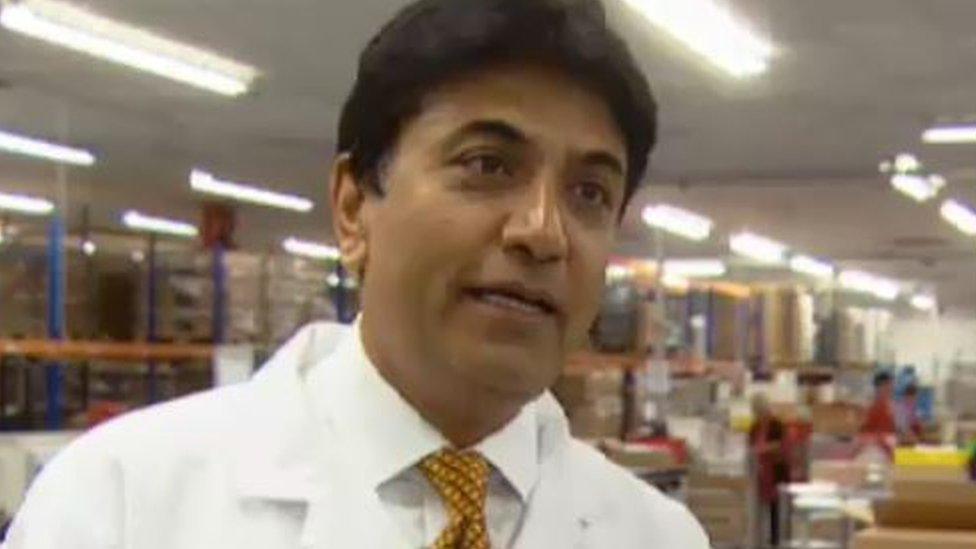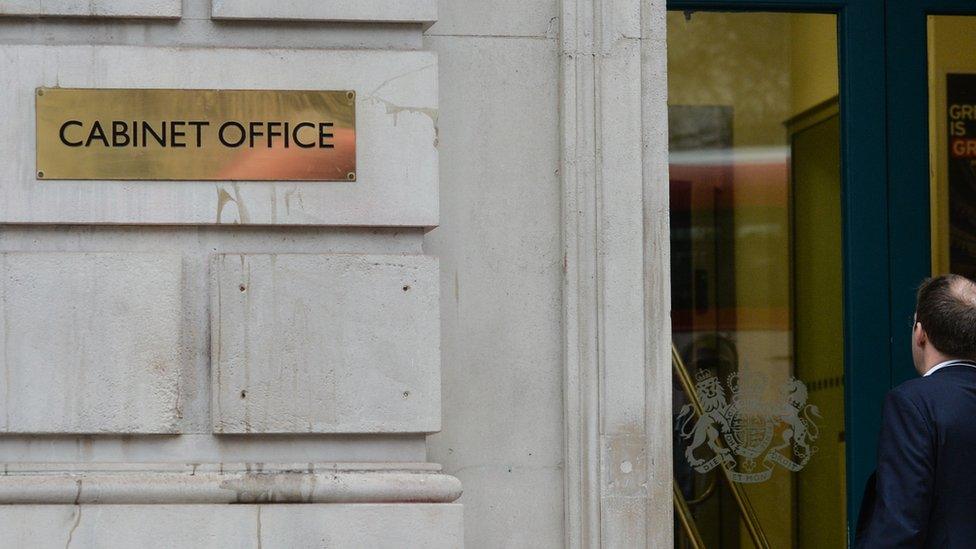Official failings in vetting of businessman for OBE revealed
- Published

Vijay Patel's business has sparked political controversy
Officials vetting a businessman for an OBE were not aware of newspaper claims his firm had overcharged the NHS for drugs, the BBC has learned.
Dr Vijay Patel was named in the 2019 New Year Honours List, external for services to "business and philanthropy".
Three years earlier, his firm had been on the front page of The Times, external in an investigation into price fixing.
Civil servants carrying out background checks on him initially failed to find the article.
And by the time they had discovered the allegations on the internet, it was deemed too late to act on their concerns, according to documents obtained by the BBC under freedom of information.
An official at the Department for Business, Energy and Industrial Strategy (BEIS) admitted lessons had be learned from the episode, the documents show.
Dr Patel declined to comment.
'Puzzled'
The Times was highly critical of the decision, external to award Dr Patel an OBE, in 2019.
This prompted a BEIS official to claim, in an email to the Cabinet Office honours unit, that it was difficult to find the 2016 Times story in a Google search using the name of Dr Patel's current company, rather than the one that had been at the centre of the controversy.
"I've been somewhat puzzled why no-one spotted an intranet [sic] article earlier, but having now undertaken a Google search on "Vijay Patel Waymade" I can see it is not obvious. The search does not result in the Times investigation articles. I will be undertaking a lessons learned exercise shortly with my team," the official wrote.
An internal BEIS timeline released under FOI states: "No-one involved in the drafting of the citation was aware of any drug price fixing allegations against Dr Patel, and the accompanying research that supported the drafting of the citation did not identify any issues of a concern that would have prompted further checks."
The document reveals that it was only at the last stage of the process that any concerns arose.
In final checks "the BEIS honours team undertook an internet Google search and identified two media stories from 2016 that referred to Dr Vijay Patel and price fixing within the NHS, and the articles said there was no indication that any firms named were under investigation by CMA (the Competition and Markets Authority)".
BEIS officials then sought advice from the Department of Health and Social Care, receiving an automatic response from the recipient's inbox. But as no further response was received, and neither BEIS nor the Cabinet Office followed up, the award of the OBE went ahead.
The document says: "The potential warning that there might be an issue of concern was noted late in the process at one of the busiest times of year for departmental honours teams."
'Rigorous processes'
This FOI release represents a puncturing of the traditional secrecy of the British honours system. The Cabinet Office has been forced to reveal details of the process behind an honour in the first such case where the recipient is still alive.

Honours are administered by the Cabinet Office
A Cabinet Office spokesperson said: "Rigorous processes are in place to protect the integrity of the honours system.
"Relevant internal processes were reviewed and systems put in place to further safeguard against instances which could cast any doubt on the honours system."
The disclosure follows a tribunal decision, external that in the public interest the government had to clarify why an OBE was given to Vijay Patel, external, the pharmaceutical businessman whose company had been accused of "profiteering" at the expense of the NHS through "extortionate" prices.
The information rights tribunal judge Chris Hughes ruled, external last month that releasing the information was necessary to explain "how and why this highly controversial honour was awarded".
He said "the mismatch between the honour and the controversy concerning Mr Patel's business is stark" and that failure to account for it publicly could harm "public confidence in the honours system".
'Unethical and unacceptable'
Dr Patel's businesses had been accused of exploiting a legal loophole in the drug pricing system and costing the NHS millions of pounds through excessive charges, according to a major investigation by The Times in 2016.
The business model involved was condemned by many politicians, external. The then Health Secretary Jeremy Hunt told MPs, external that it was "a particularly unethical and unacceptable practice of drugs companies getting control of generic drugs for which they command a monopoly position and then hiking the prices".
Dr Patel's company Atnahs, external acquired manufacturing rights for older medicines which were out of patent but still in use within the NHS.
By changing their status from branded to generic products, the company was legally allowed to increase their prices, while facing limited if any competition from other suppliers.
Prices paid by the NHS for several medicines acquired by Atnahs were raised sharply. For example, according to the Times, external, a pack of Sinepin antidepressants was increased in price from £5.71 to £154, while a pack of Welldorm insomnia tablets rose from £12.10 to £138.56.
The government introduced the Health Service Medical Supplies (Costs) Act 2017 to close this loophole and cap such prices.
The official honours citation said that Dr Patel's OBE, announced in the 2019 New Year Honours List, external, was for services to "business and philanthropy".
'Perverse'
Dr Patel has donated substantial sums, external for bursaries and equipment to De Montfort University in Leicester, where he was once a pharmacy student. He has also funded a family charitable foundation, the Shanta Foundation, external.
The OBE award was widely criticised, external, with a Times editorial, external describing it as "perverse".
The Cabinet Office maintains that full probity checks are carried out before any honour is granted, and that to work properly the system needs to be fully confidential.
Helen Ewen, head of the Honours Secretariat, argued at the tribunal case that releasing any information about internal discussions of individuals nominated for honours could damage the future frankness of the process.
The tribunal's decision largely upheld a previous ruling from the information commissioner, external in January 2020, which said disclosure was needed because "there is real concern, and indeed a lack of understanding, as to why this particular honour was awarded."
In the past Atnahs has said, external that its "pricing continues to be competitively benchmarked".
